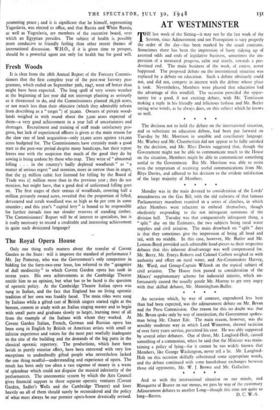The Royal Opera House
Only one thing really matters about the transfer of Covent Garden to the State: will it improve the standard of performance ? Mr. Jay Pomeroy, who was the Government's only competitor in bidding for the forty-two-year lease, has referred to the " quagmire of dull mediocrity " to which Covent Garden opera has sunk in recent years. His own achievements at the Cambridge Theatre entitle him to an opinion, but what has to be faced is the question of operatic policy. At the Cambridge Theatre Italian opera was sung in Italian, and the fact that England has no living operatic -. tradition of her own was frankly faced. The main roles were sung by Italians while a gifted cast of British singers started right at the bottom, content to study with an Italian singing master and to begin with small parts and graduate slowly to larger, learning most of all from the example of the Italians with whom they worked. At Covent Garden Italian, French, German and Russian opera has been sung in English by British or American artists with small or inferior experience and voices for the most part woefully inadequate to the size of the building and the demands of the big parts in the classical operatic repertory. The productions, which have been lavish in purely exterior effect, have been entrusted with very few exceptions to undoubtedly gifted people who nevertheless lacked the one thing needful—understanding and experience of opera. The result has been only. too often a vast expense of money in a waste of splendour which could not disguise the musical inferiority of the performances. The uneconomic system by which the Arts Council gives financial support to three separate operatic ventures (Covent Garden, Sadler's Wells and the Cambridge Theatre) and loses heavily on all of them should surely be reconsidered and the policy of what must always be our premier opera-house drastically revised.


































 Previous page
Previous page